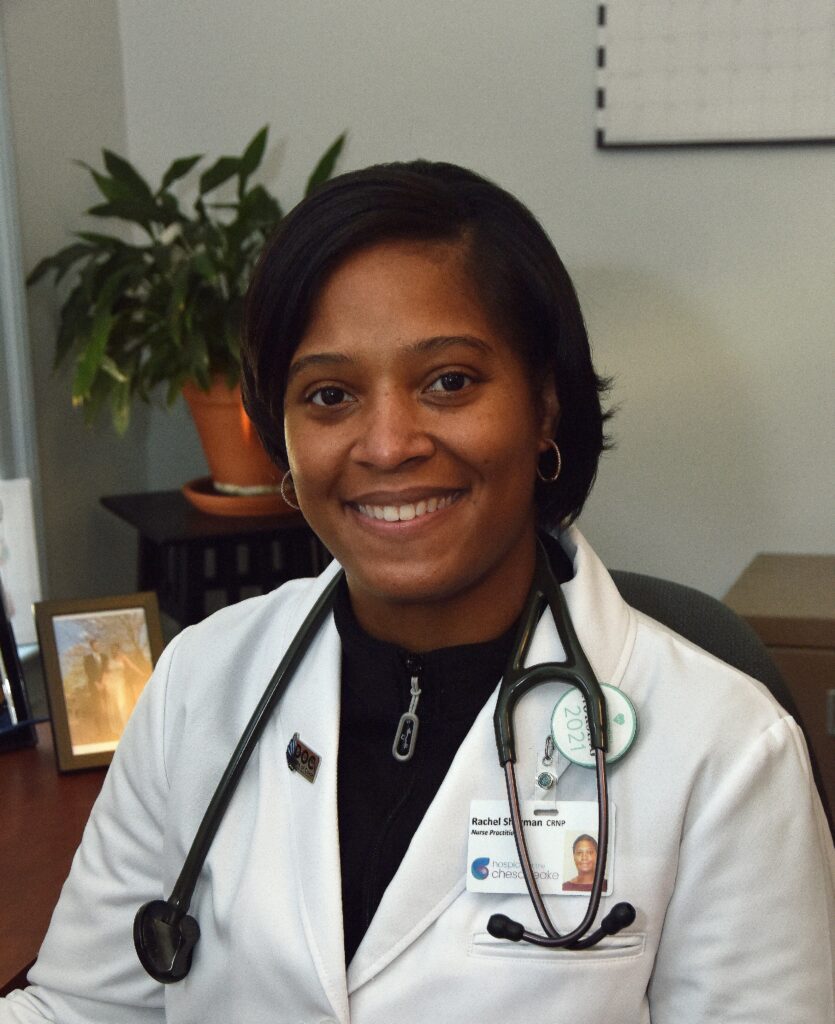
Rachel Sherman, DNP, APRN, FNP-BC, ACHPN, Director of Medical Services
There is a startling statistic reported by the National Hospice and Palliative Care Organization in 2020. Of the 1.55 million Medicare beneficiaries who received hospice that year, only 8.2% of them were Black. It is one of many statistics that show a lack of access to healthcare among the Black population in our nation. Among hospice professionals, this is not a surprise. We know the numbers. That’s why Hospice of the Chesapeake is doing something about it.
The low numbers of Black people using hospice isn’t because they are healthier. In fact, they are more likely to have diabetes, high blood pressure and heart disease. For most, these health issues are not genetic. Many are fighting health issues because they are fighting food insecurities, poor educational opportunities, a lack of jobs, and more. Many can’t afford the medicines they need to manage their diseases or conditions. They must decide between paying their housing and utilities or filling a prescription. Others can’t get to the healthcare they need because it is too far from where they live.
I have seen far too many times where a person of color may present with a symptom or complaint and they’re dismissed. As a Black woman, it disturbs me we are more than 2.5 times more likely to die while pregnant than White women. It is well known that there is a lack of trust that comes from historical injustices against their race by the medical community. This includes “eugenics” programs that forced sterilizations of Black women and the infamous Tuskegee syphilis study.
For a good while in America, Blacks weren’t a priority. That’s changing now. To make that change, we must understand the barriers and then identify ways to break them down. In January 2017, Hospice of the Chesapeake and our palliative care service, Chesapeake Supportive Care, began an initiative to improve access to palliative care for Black patients. From the beginning we’ve seen signs this initiative is working. We have seen steady increases in the percentage of people of color accessing both hospice care and supportive care.
To build bridges in our communities, Hospice of the Chesapeake has focused on nurturing relationships with people and organizations vital to Black families. We get boots on the ground in the community, hosting education sessions at senior centers, libraries, schools, religious centers and with lawmakers.
One of the first barriers we addressed was making sure our staff reflects the communities we serve. We focused on the recruitment and retention of people who identify as Black. People can see they have a place at Hospice of the Chesapeake because we hire professionals who people of color can relate to. People who might more acutely understand their fears and concerns. When a Black family meets me, a Black nurse practitioner, there’s a commonality there that may promote a certain level of comfort. They see in me that they are represented in this organization. Trust and commonality are essential when you’re concerned about the impending loss of your loved one or advanced illness in yourself.
To build bridges in our communities, Hospice of the Chesapeake has focused on nurturing relationships with people and organizations vital to Black families. We get boots on the ground in the community, hosting education sessions at senior centers, libraries, schools, religious centers and with lawmakers. I and many others on our team do a lot of talking at local churches and work to build relationships with their pastors and faith leaders. We recognize that in communities of color there is a strong tie to their religious leaders and this is an important part of understanding unique cultures.
Another barrier is the cultural idea that “I can take care of myself” and “I don’t want a government handout.” That is across the board in many cultures — not just Black — from Asian Pacific to Latinx. When I talk about hospice care, I explain to anyone who will listen that the Medicare Hospice Benefit is something you’ve already paid for and you deserve to access that care. You have worked hard, you have paid your Medicare taxes, and in paying those taxes you are owed this care. We can help you access care, navigate the process and ensure your unique goals and needs are meet.
Cultivating a culture of acceptance means paying attention to every detail. Ensuring your marketing material reflect the families that we serve. Striving to ensure your leadership is diverse. Always working to gain the community’s trust. Are we as diverse as we could be? Well, that’s something we’re working on. And I love that about our organization.


